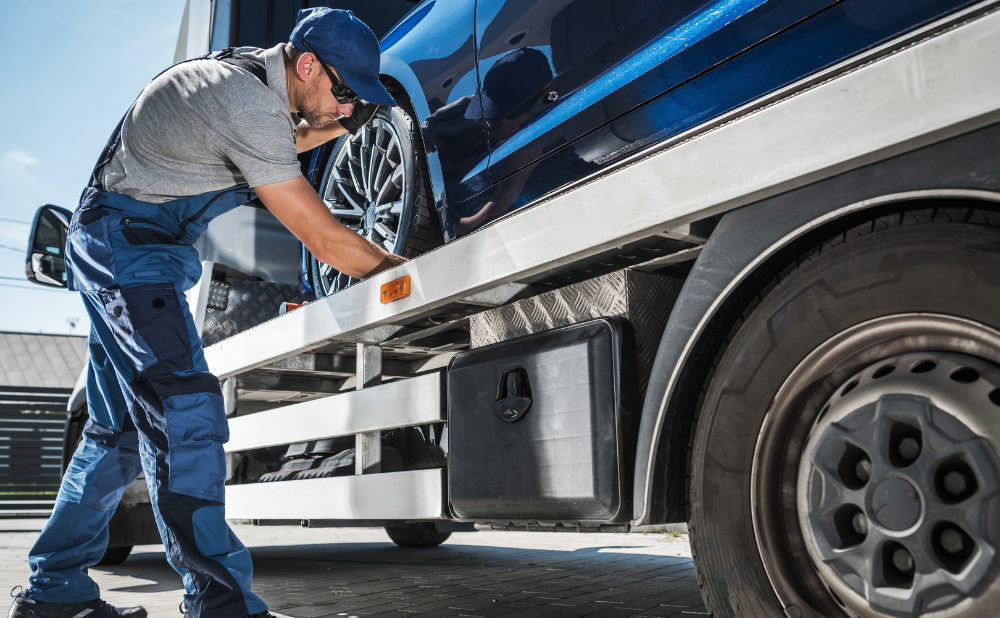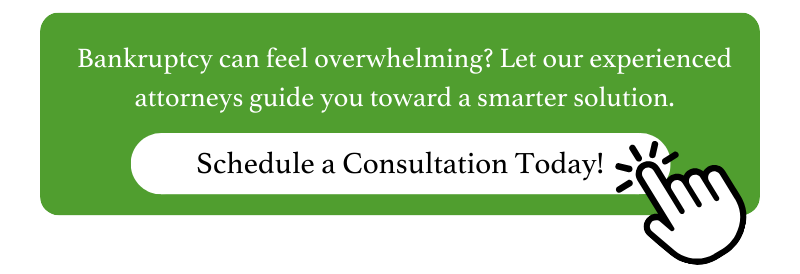When you’re behind on payments and facing the possibility of losing your vehicle, the stress can be overwhelming. If you’re wondering, “Does filing for bankruptcy stop repossession?”—the answer is often yes. In Pennsylvania, filing for bankruptcy can temporarily halt repossession efforts through a legal mechanism known as the automatic stay. But as with most legal matters, the full answer depends on your specific situation.
Does filing for bankruptcy stop repossession permanently? That depends on the type of bankruptcy you file and where you are in the repossession process. Filing triggers an automatic stay, which immediately pauses most collection activities, including vehicle repossession. This court-ordered protection gives you breathing room to assess your finances and consider your legal options. However, the type of bankruptcy—Chapter 7 or Chapter 13—and the timing of your filing play a key role in what happens next.
In the article below, we’ll explore how bankruptcy works in Pennsylvania when it comes to car loans and repossession. Whether you’re just beginning to consider bankruptcy or already facing the loss of your vehicle, knowing your rights and options can help you make informed decisions.
How Bankruptcy’s Automatic Stay Affects Repossession
In Pennsylvania, the moment you file for bankruptcy, the automatic stay takes effect. This is a powerful legal protection that immediately stops most collection efforts—including vehicle repossession. It also halts actions like wage garnishment, foreclosure proceedings, and creditor lawsuits, giving you much-needed breathing room.
The automatic stay applies whether you file Chapter 7 or Chapter 13 bankruptcy. It’s designed to give you immediate relief and time to assess your financial situation or create a repayment plan under court supervision.
However, timing is crucial. If your vehicle has already been repossessed, you’ll need to act quickly. In Pennsylvania, lenders aren’t required to hold a vehicle for long after repossession. While laws may vary slightly by situation, once the car is sold at auction, bankruptcy is unlikely to reverse the sale. At that point, you may lose the chance to reclaim your vehicle or stop further collection efforts on any remaining loan balance.
To fully protect your rights, it’s important to speak with a Pennsylvania bankruptcy attorney as soon as possible—especially if you’ve received notice of intent to repossess or are already behind on payments.
Chapter 7 Bankruptcy and Vehicle Repossession in Pennsylvania
Chapter 7 bankruptcy can provide immediate, though temporary, relief from vehicle repossession through the automatic stay. However, if your goal is to keep your car long-term, you’ll need to take further action beyond simply filing.
If you’re considering Chapter 7 in Pennsylvania, here are your primary options:
- Redeem the Vehicle – You may be able to redeem your car by paying the current fair market value in a lump sum. This can be a good option if your vehicle is worth significantly less than what you owe—but it requires you to have or obtain the funds upfront.
- Reaffirm the Car Loan – Reaffirmation allows you to continue making payments on the auto loan outside of the bankruptcy process. By signing a reaffirmation agreement, you’re committing to keep the vehicle and remain liable for the debt. This option should be considered carefully, as it reinstates your personal obligation.
- Use Pennsylvania Bankruptcy Exemptions – If you have equity in the vehicle, you may be able to protect it using state or federal bankruptcy exemptions. In Pennsylvania, you can choose between state or federal exemption systems, depending on which offers more protection in your situation. A knowledgeable attorney can help determine which exemptions apply and whether they cover the full equity in your car.
- Surrender the Vehicle – If keeping the car isn’t financially feasible, Chapter 7 gives you the option to surrender it and discharge any remaining loan balance—also known as the deficiency balance. This can be a clean break that allows you to eliminate debt and start fresh without the burden of an upside-down auto loan.
Each of these options comes with legal and financial trade-offs. Consulting with a law firm like Bumbaugh | George | Prather | DeDiana can help you make the best decision based on your unique financial situation, vehicle value, and goals. Their team can assess whether Chapter 7 is the right fit and guide you through the exemption and reaffirmation processes with confidence.
Chapter 13 Bankruptcy: A Powerful Tool Against Repossession
If you’re behind on your car payments but want to keep your vehicle, Chapter 13 bankruptcy may be a more effective and flexible option. Unlike Chapter 7, which focuses on liquidation, Chapter 13 allows you to reorganize your debts and catch up on missed payments over time—often stopping repossession in its tracks.
Key benefits of Chapter 13 for Pennsylvania vehicle owners include:
- Catching Up on Missed Payments – Your Chapter 13 repayment plan allows you to spread out past-due car loan payments over a 3- to 5-year period, helping you get current without facing immediate repossession.
- Lowering the Loan Balance (Cramdown) – If you’ve owned the vehicle for at least 910 days (about 2.5 years), you may be able to reduce the loan balance to the vehicle’s current market value—a process called a cramdown. This can significantly lower what you owe if your car is worth less than the loan amount.
- Extending the Repayment Term – Chapter 13 may also allow you to stretch your car loan payments over the length of your bankruptcy plan, reducing your monthly burden and making the loan more manageable.
- Protecting the Vehicle from Repossession – The automatic stay goes into effect as soon as you file, preventing lenders from repossessing your vehicle while your plan is under review and in effect.
Chapter 13 is often ideal for individuals with steady income who have fallen behind but want to protect important assets like a car. However, it’s not right for everyone.
That’s where a skilled bankruptcy attorney can make a difference. The team at Bumbaugh | George | Prather | DeDiana can help you determine whether Chapter 13 is the most strategic option for your situation. They’ll guide you through plan creation, court filings, and creditor negotiations—giving you the tools to stay in control of your vehicle and your financial future.
Can You Get Your Car Back After Repossession?
If your car was recently repossessed, filing bankruptcy might help you get it back. But you need to act quickly, ideally within days of the repossession. It is advisable to speak to an experienced bankruptcy attorney right away.
Once you file, the automatic stay requires the lender to return your vehicle if they haven’t sold it yet. You’ll then need to work out a plan to catch up on car loan payments or redeem the vehicle. Remember, it’s not merely about getting the car back. It’s about creating a sustainable financial solution.
Can You Get Your Car Back After Repossession in Pennsylvania?
If your vehicle has recently been repossessed in Pennsylvania, you may still have a chance to get it back—but you need to act fast. Filing for bankruptcy shortly after repossession can, in some cases, compel the lender to return the vehicle—but timing is critical.
Under federal bankruptcy law, once you file, the automatic stay goes into effect. This legal protection temporarily halts collection efforts, including vehicle repossession and resale. If the lender has not yet sold the vehicle, they may be legally required to return it. However, Pennsylvania law does not guarantee indefinite holding periods, so acting within days of the repossession is often necessary.
After recovering the vehicle through bankruptcy, you’ll need to decide how to move forward. Your options may include:
- Catching up on missed payments through a Chapter 13 repayment plan
- Redeeming the vehicle by paying its current market value in a lump sum (often under Chapter 7)
- Reaffirming the loan and continuing payments outside the bankruptcy process
It’s important to understand that this process isn’t just about reclaiming your car—it’s about creating a path toward long-term financial stability. Speaking with an experienced Pennsylvania bankruptcy attorney, such as the team at Bumbaugh | George | Prather | DeDiana, can help you evaluate your options and take decisive legal action before it’s too late.
The Risks of Waiting Too Long to File Bankruptcy in Pennsylvania
Delaying a bankruptcy filing until after your vehicle has been repossessed can significantly limit your options. Acting early often provides greater flexibility and better outcomes. Here’s why timing matters:
Filing before repossession can prevent the stress, disruption, and additional costs associated with losing your vehicle. It also gives you more time to negotiate with your lender, explore repayment options, and avoid fees related to towing, storage, or resale.
Additionally, if your car is repossessed, you may lose access to personal belongings left inside the vehicle. Filing bankruptcy early can help protect both your vehicle and your property.
A bankruptcy attorney can help you understand your legal rights, evaluate your financial options, and develop a strategy that fits your needs. Bankruptcy may offer immediate relief from collection actions through the automatic stay, giving you space to regroup and pursue a more stable financial future.
Alternatives to Bankruptcy for Stopping Repossession
While bankruptcy law provides powerful protections—such as halting repossession through the automatic stay—it’s not always the only or best solution. In some cases, borrowers may be able to resolve legal issues related to their car loan without filing for bankruptcy. Exploring debt relief alternatives may offer a more flexible or less disruptive path forward.
Here are a few options to consider if you’re trying to avoid having your lender repossess your vehicle:
- Negotiate a repayment plan with your auto lender to catch up on missed payments. Many lenders would rather restructure a loan than go through the cost of repossession and resale.
- Refinance the loan to reduce your monthly payment or interest rate, potentially improving your ability to keep up.
- Sell the vehicle and use the proceeds to pay off the loan balance. This option may help you avoid repossession and limit damage to your credit.
- Voluntarily surrender the vehicle before your lender repossesses it. This may help reduce associated fees and allow for a more cooperative exit.
Each alternative has pros and cons depending on your financial situation and loan terms. Some may still involve legal issues, such as contract obligations or deficiency balances. In certain situations, court approval might even be required—especially if you’re already involved in bankruptcy proceedings.
Consulting a knowledgeable bankruptcy lawyer can help you understand your rights and weigh the best option for protecting your vehicle and your financial health.
Long-Term Considerations: Life After Bankruptcy
Does filing for bankruptcy stop repossession? Yes, but it’s not just about preventing your lender from repossessing your car—it’s about understanding the long-term consequences of using bankruptcy law for debt relief.
Here are a few important considerations:
- Credit Impact – A bankruptcy filing may significantly affect your credit score, potentially limiting your ability to access loans, leases, or credit cards for years to come.
- Car Loans After Bankruptcy – While you may keep your car during bankruptcy, obtaining a new auto loan after filing can be difficult or more expensive.
- Housing and Employment – Bankruptcy may appear in background checks by landlords or employers, especially in fields involving financial responsibility.
- Ongoing Legal Obligations – Even after bankruptcy, you’ll still need to meet any reaffirmed debts or payment terms agreed to in the case.
While bankruptcy law can offer a fresh start, it’s not a decision to take lightly. Working with an experienced bankruptcy lawyer can help you fully understand the trade-offs and create a long-term plan that addresses both your current crisis and future stability. They can guide you through the legal process, help you navigate potential legal issues, and protect your rights throughout the process.

Conclusion
Filing for bankruptcy can be a powerful tool for stopping vehicle repossession and managing overwhelming debt—but it’s not a decision to take lightly. The automatic stay that goes into effect when you file provides immediate legal protection from repossession, wage garnishment, and other collection actions. However, to maintain that protection, you must address your car loan as part of the bankruptcy legal process and meet all court requirements.
Does filing for bankruptcy stop repossession? In most cases, yes—but your long-term outcome depends on your financial goals, the value of your vehicle, and whether you pursue Chapter 7 or Chapter 13 bankruptcy. Chapter 13 may allow you to catch up on missed payments through a structured repayment plan, while Chapter 7 may help eliminate debt and allow you to surrender or reaffirm your loan.
If you’re behind on car payments or struggling with credit card debt, don’t wait until your options are limited. Speaking with a knowledgeable bankruptcy attorney can help you evaluate your options, protect your assets, and create a plan for moving forward with confidence. Acting early gives you the best chance to regain control and build a more stable financial future.
FAQs about Does Filing for Bankruptcy Stop Repossession
Do bankruptcies clear repos?
Filing for bankruptcy can stop a pending vehicle repossession through the automatic stay. If the repossession has already occurred, bankruptcy won’t “undo” it—but it may eliminate your legal obligation to repay any deficiency balance (the remaining amount owed after the car is sold). However, bankruptcy does not erase the repossession from your credit report; the negative mark will still appear for up to seven years.
Is it better to file bankruptcy or have a car repossessed?
It depends on your overall financial picture. If your car loan is your only major concern, repossession may be less disruptive. But if you’re dealing with multiple debts, bankruptcy could offer broader debt relief and long-term financial stability.
Keep in mind that bankruptcy law impacts all of your debts—not just your auto loan—and comes with lasting consequences for your credit. A qualified bankruptcy attorney can help you evaluate your specific situation and determine the most effective path forward.
Does bankruptcy clear an auto loan?
Yes, Chapter 7 bankruptcy can discharge your personal liability for an auto loan, but you may be required to surrender the vehicle unless you choose to redeem it (by paying its current market value) or reaffirm the loan and continue making payments.
In a Chapter 13 bankruptcy, you may be able to keep your car by restructuring the loan through a court-approved repayment plan. In some cases, you may even reduce the loan balance or interest rate depending on your situation.
How to get rid of repossession debt?
Bankruptcy is often the most effective way to discharge debt remaining after a car repossession, especially if you owe a large deficiency balance. Outside of bankruptcy, you could try to negotiate a settlement with the lender or wait for the statute of limitations on the debt to expire—which varies by state, including Pennsylvania.
However, waiting too long to resolve repossession debt can harm your credit and create financial setbacks. It’s best to discuss your options with an experienced bankruptcy lawyer who can help you protect your rights and minimize long-term damage.








